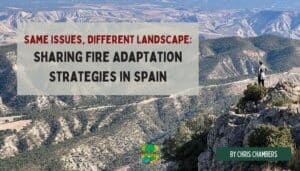Editor’s note: This letter from FAC Net staff was published in our monthly newsletter last week, and we wanted to share the sentiments once again with our blog readers. 2022 was a packed year for FAC Net – and 2023 looks like it’ll hold just as much if not more meaningful collaboration and work towards our fire adapted future. If you’re not already subscribed to our monthly newsletter, get on our list here!
2022 was full of opportunities and action for those of us working on fire issues. The wildfire resilience sector is growing, federal funding for wildfire work is at an all-time high, and the needs of our communities and landscapes have never been greater. The good news is that communities are organizing – creating partnerships and programs that improve fire outcomes for people and places. These community-based actions are as varied and diverse as the communities organizing them and their work is the basis for a more fire resilient future.
FAC Net was originally conceived as a learning community for people leading fire resilience efforts: a place to share practices and programs, articulate the range of FAC practice, and change our relationships with fire in fundamental, systemic ways. 2023 will mark ten years since the network was launched by a small group of leaders. In that time, we’ve supported and trained hundreds of community-based leaders, funded and helped shape projects and programs in communities, and articulated a vision for a better fire future. Together, we’ve defined the range of knowledge and practice that shapes relationships among people, fire and place.
Our work expanded and evolved in 2022:
The network still offers peer learning and professional development for place-based wildfire resilience practitioners, and we also focus staff time and resources on:
- partnerships with researchers, national organizations and agencies, and philanthropic entities;
- providing leadership in state wildfire task forces and participating in policy coalitions and partnerships;
- developing resources and tools for people seeking to increase their wildfire resilience (whether or not they want to participate in a learning network); and
- conducting special projects that advance FAC practice and systems change efforts.
Looking forward to 2023:
This year is packed with opportunities and offerings. Network members will have access to professional development and training in diversity, equity, inclusion and justice, practitioner wellbeing, facilitative leadership, disability access in emergencies and preparedness, and more. Join FAC Net (it is free and easy!) to gain access to learning opportunities and to connect with other practitioners.
Staff are conducting a number of projects with research partners including continuing to enhance the FAC Pathways strategy tool (digital app coming soon!); a project focused on wildfire narratives; work to understand smoke and public safety power shut-off impacts to communities; and work looking at how to align and design state and federal investments in wildfire resilience to maximize impacts and outcomes.
Special projects on deck this year include working in partnership with the Community Wildfire Planning Center to develop a CWPP toolkit for the State of California; funding a cohort of communities to launch clean air initiatives/mitigate smoke impacts; and developing more practical resources and how-to guides for fire adaptation before, during and after a fire.
What makes this work possible?
A number of philanthropic organizations and donors support our opportunity funds and special projects. Our work is part of the national Fire Networks partnership that invests in people and place-based efforts to change relationships with fire, helping us foster shared responsibility for fire management and viable fire cultures in landscapes and communities across the country.
Three actions to take in the New Year:
Wildfire resilience work is a year-round effort that requires action and reflection. As we turn our calendars to 2023, consider how these practices (inspired by 2022 blog authors) could move your work forward:
“What if we knew 25 years ago that our wildfire problems would become a crisis? Could we have mustered the political, economic, technical, and societal will and resources to avert the disastrous losses we’ve experienced? ” -Chris Chambers
“…front-line workers perform the bulk of vegetation management prior to wildfires, disaster relief during fire events, and recovery after a fire event. But for the overwhelming majority of workers in these front-line communities, that’s where their career in fire ends – in the lowest paid roles, lacking any exposure or access to power or decision making.” -Chuck Ervin
“A practice of hope doesn’t require a gut feeling that everything will be ok. It doesn’t require me to innately be a glass half full optimist. It doesn’t require minimizing the problems we face to protect the fragile illusion that it will all just work out somehow. It is, as Kaba points out, a deliberate action, not a feeling.” – Laurel Kays
With gratitude for all you do as part of the movement for better fire,
Your FAC Net Staff Team
****




